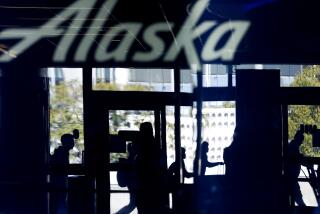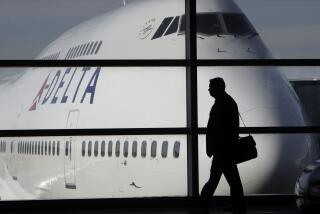Twice-Canceled Flight Leaves Britain
- Share via
WASHINGTON — British officials allowed an afternoon flight from London to Washington to resume on Saturday after it had been canceled for two consecutive days over concerns of a possible terrorist attack.
But even as British Airways’ Flight 223 touched down safely Saturday night at Washington Dulles International Airport, the airline’s flights to and from Saudi Arabia remained grounded, and international aviation officials warned that security concerns behind the recent spate of disruptions would likely be a long-term situation.
“I think the threat we now face is likely to endure for many years,” said British transport secretary Alistair Darling. “Because of the increased level of threat we are likely to live with for some time, there will be increased security, more intense checks [and] there may occasionally from time to time be the need to ground a particular flight.”
Darling said British Airways had grounded Flight 223 to Washington in previous days because of “specific information,” but declined to elaborate.
The resumption of the flight Saturday raised some hope that the disruptions that marked air travel through the holidays might diminish as the new year gets underway.
The airline’s route between Heathrow Airport in London and Dulles airport in northern Virginia has been the focus of particular scrutiny, with flights between those cities canceled three times in two days and a fourth flight delayed.
British Airways was expected to decide this weekend whether to allow its flight to Riyadh, Saudi Arabia, to resume Monday.
In all, seven international flights have been canceled since Bush administration officials placed the United States on orange, or “high,” alert for potential terrorist attacks Dec. 21. Other flights have been disrupted or escorted by military fighter planes.
In Mexico City, Aeromexico’s Flight 490 to Los Angeles was canceled Wednesday and Thursday. On Friday, the flight was delayed but did take off, and it landed at LAX about 11:35 p.m.
Though passengers have for the most part shown patience with the security precautions, the groundings and disruptions have begun to cause some international grumbling.
British Airways spokeswoman Gwen Jones dismissed reports from the U.S. suggesting that the recent spate of European-origin flights being denied permission to land at American airports was because of European reluctance to abide by Washington’s newly mandated security measures.
“Rubbish,” Jones said. “The reason we have not flown is because the [British] government has advised us not to do so.” And she said the British government “has not asked us to put any marshals aboard 223.”
But there has been speculation in Britain, even among British Airways executives, that the company’s vocal opposition to putting armed air marshals on its flights might have contributed to a “political” grounding.
After Flight 223 was canceled on New Year’s Day, airline executives considered and dismissed the possibility that Washington was trying to make a high-profile example of British Airways because of its reluctance to embrace the use of armed air marshals.
The British government said Dec. 28 that it would proceed by selectively assigning air marshals to some flights into the United States.
Some Mexican officials have questioned the demands by the United States for canceling the Aeromexico flights despite extraordinary security steps. They noted that national authorities had stepped up screenings of passengers and baggage and had arranged for armed Mexican guards to be aboard the flights.
Officials and passengers in other countries have also questioned whether the reaction to the intelligence warnings has been too severe, particularly since no terrorist suspects have been arrested.
But American intelligence officials have said the precautions have been prompted by references to specific routes, dates and flight numbers in “chatter” on known Al Qaeda communications channels monitored by U.S. eavesdropping equipment. Other information, they said, has come from informants and detainees.
Darling stressed that the British government has ordered flights canceled only as a last resort, in cases where the underlying intelligence is specific and considered credible.
He said the decisions have been based on information collected by British intelligence as well as information provided by the United States.
“We look at the intelligence ourselves,” he said. “We evaluate it, and then we decide what the appropriate action is.”
*
Times staff writer Miller reported from Washington; correspondent Wallace from London.
More to Read
Sign up for Essential California
The most important California stories and recommendations in your inbox every morning.
You may occasionally receive promotional content from the Los Angeles Times.










